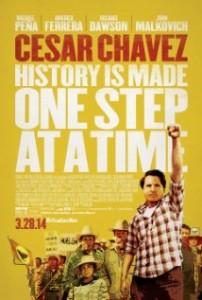 Directed by Diego Luna, Cesar Chavez stars Michael Peña, America Ferrera, Rosario Dawson and Gabriel Mann.
Directed by Diego Luna, Cesar Chavez stars Michael Peña, America Ferrera, Rosario Dawson and Gabriel Mann.
Biopics are notoriously uneven. For every Malcolm X or Walk the Line there’s a J. Edgar or De-Lovely waiting to underwhelm. Add Cesar Chavez to the latter list. The film, directed by Diego Luna, has only the noblest of intentions. It chronicles the struggles of Cesar Chavez (Michael Peña) as he organizes farm workers, eventually forming the United Farm Workers of America and winning the long fight for better working conditions on California farms. As an uplifting lecture on the farm workers movement, it is more or less effective. As a biography on Chavez, however, it falls short. Cesar Chavez is essentially a history lesson, 101 minutes of fact after fact, event after event. It’s a shame that the film doesn’t quite work, because there’s such great talent behind it.
The cast includes the likes of America Ferrera (Helen Chavez), Rosario Dawson (Dolores Huerta), and John Malkovich (Bogdanovitch, a farm owner and central antagonist), who all give convincing, layered performances. The film is beautifully shot with great feel for the texture and atmosphere of rural California by Enrique Chediak (127 Hours), although the exhausting frequency of shots featuring characters walking against a sunset nearly crosses the line into self-parody.
It is the script, co-written by Kier Pearson and Timothy J. Sexton (both Oscar nominees), where the film’s biggest problems are found. The storyline is entirely content to move through the well-established facts of Chavez’s activism, chronicling the beginnings of the United Farm Workers through the grape boycotts and march to Sacramento until a line of text before the credits tells us that Chavez eventually won the right for farm workers to bargain collectively. What the script lacks is any notion of the human beings that bled for the cause. The characters in the film no more than ciphers for an ideal or viewpoint. Chavez represents the hope for a better future and Bogdanovitch represents oppressive corporate interest.
There are some moments and scenes that try to show the lives of these people, but they all fall flat and wind up coming across as strangely bizarre. There is a subplot with Chavez’s son, meant to provide human and family drama and another dynamic to the struggles he Chavez faced, in which the boy is unhappy and feels neglected by his father whom he sees as only caring about the union. So he goes to live with another family member and eventually loses contact with his father. It’s hard to care too much what happens to the boy since it comes across as so ham-fisted, for even in this should-be-gripping conflict, the son, just like the other principal characters, is no more than a symbol, a one-dimensional plot device of internal struggle and the personal cost of the greater good.
Strangely enough, it is Malkovich’s character who has the most depth, although this in part is due to the actor giving the film’s best performance. Unfortunately, the depth that the script does give Bogdanovitch is pretty confusing and antithetical to everything else the film is. There are moments when it seems we are almost begged to sympathize with him, to think that he is not such a bad guy after all. He is, sometimes, truly torn, completely unsure what to do or how to handle the situation, even chastising a xenophobic colleague at one point. But then, moments later, he will be flattened back into one dimension.
While Cesar Chavez is well-made, the history doesn’t come alive. The goal of the film is to make the audience feel touched by the triumph of civil rights over injustice, but without any three-dimensional characters at the center, it’s tough to come out of the theater feeling anything other than lectured. That said, there are some stirring moments in the film: beatings, strikes, and hard-luck workers marching for what they believe in. Unfortunately, these moments, handled with a good feeling for drama from director Diego Luna, aren’t enough to make the film rise above its flaws. Still, it’s not a bad movie. For a primer on the accomplishments of Cesar Chavez one could do worse than this, which is well-made, briskly paced, and generally pleasing to watch. It just could have been so much more.